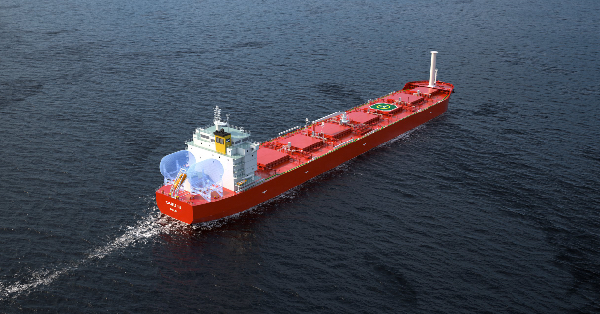A subsidiary of Klaveness Combination Carriers has entered into a Letter of Intent (LOI) with Jiangsu New Yangzi Shipbuilding Co. Ltd (“YZJ”) for construction of three third generation (“CABU III”) vessels for delivery in the period Q1-Q3 2026. The modern CABU III newbuilds will incorporate Klaveness’ decades of experience, deliver large improvements in energy efficiency, and bring KCC closer to offer a zero-emission service to its customers.
The CABU III newbuilds will introduce a new standard of efficiency with an estimated 35% reduction in carbon footprint than the first generation CABU vessels built between 2001 and 2007, which the newbuilds will replace. This improvement is both a result of economies of scale and substantially improved fuel efficiency adding to KCC’s already highly efficient combination trades. In these trades where the CABU fleet ships caustic soda into Australia and various dry bulk commodities out of Australia, the CABU III newbuilds will offer an estimated 50-60% lower carbon emission per ton transported than standard dry bulk and tanker vessels.
The new vessels will have around 10% higher cargo carrying capacity and the fuel consumption is estimated to be 30% lower than the first generation CABUs through an optimized design and installation of several energy efficiency measures partly tested out on KCC’s current fleet over the recent years. Furthermore, KCC targets to install wind assisted propulsion on the CABU III newbuilds, improving efficiency even further. The vessels will as well be prepared for a later time- and cost-effective conversion to burning zero-emission fuels, offering KCC’s customers a pathway to zero-emission freight.
KCC’s CEO Engebret Dahm said: “The new CABU III vessels will introduce a new era of carbon efficiency in KCC’s Australia trade. These newbuilds are key for positioning KCC for expected growing caustic soda import volumes to Australia and for meeting its ambitious targets of an approximately 45% reduction in its carbon intensity within 2030 relative to its actual 2018 performance.”
To part-fund the contemplated order, KCC has successfully completed a NOK 550 million private placement and will in addition use cash on balance sheet and raise bank debt prior to delivery. The shipbuilding contract with YZJ is expected to be concluded within the end of June 2023.
Source: Klaveness Combination Carriers









































